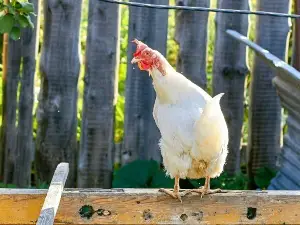
Chickens can become injured pretty easily, these birds are easy targets for predators, they can become injured by items in their environment, they can be injured by other chickens, and, they can injure themselves.
Wound infections can develop and these infections can cause the wound to smell. This article explores what to do if your chicken’s wound starts to smell.
Table of Contents
Chicken’s wound smells:
Infections of a chicken’s wound can still develop even if you take precautions to keep this from happening. If your bird’s wound starts to smell, then the bird’s wound is very likely infected.
An infected wound will have a distinct smell, it will smell rotten, sickly sweet, putrid or it can smell ammonia like depending on the bacteria in the wound.
A bird with an infected wound may act lethargic if her wound is infected.
If the infected wound is superficial then the bird will have an easier time recovering, if the bird’s infected wound goes deeper, into the body cavity, then this infected wound will be more difficult to recover from, and the bird may not survive it.
What to do:
You’d need to treat the bird if her wound becomes infected. Wash your hands before touching the bird to keep bacteria from spreading. You may also want to wear vinyl gloves to keep the both of you protected as you work on her
Treat the bird:
If you’re planning on treating your bird at home you can use an antiseptic ointment on the wound packing it in to get rid of the infection. You’d need to do this daily to get rid of the infection
Using a wound cleaner, that contains chlorhexidine, on the wound will also be useful.
Mouthwashes containing this ingredient can be used if you can’t find a wound cleaner that contains this chemical. Avoid using a mouthwash that contains alcohol on your bird’s wound.
The alcohol in the mouthwash will irritate the bird’s wound and damage the healthy tissue in the area.
Also, avoid using bleach on the wound as this will give the bird a bleach burn. The bleach will eat the flesh and make the bird’s skin change color to black
Betadine can also be used in place of a wound cleaner that contains chlorhexidine.
You’d need to repeat the cleaning of the wound, and the application of the topical antibiotic, on a daily basis, or even twice daily, for the first 3 days, and then daily until the wound heals completely.
The open and infected wound will likely attract a variety of parasites, like maggots, who like to feed on rotting flesh. If the bird has maggots on her you’d need to regularly remove these parasites with a pair of tweezers.
Isolate the bird:
Make sure that you keep this bird isolated as it recovers. If the bird is not isolated, other birds in the flock will try to peck at the wound out of curiosity, this will only make matters worse.
Keep the injured bird isolated to keep this from happening
Keeping the bird isolated will also help manage her stress and this will help her heal better. Keep the bird in a warm and quiet location as she heals.
Keep her eating and drinking:
You’d need to make sure that your bird is eating and drinking the right foods and drink as her wound heals. Give her extra protein in the form of scrambled eggs, chick crumbs, and mashed-up boiled eggs.
Make sure that she drinks enough water as well, add some electrolytes into her water for good measure.
Offer antibiotics:
If the bird doesn’t seem to be improving then you’d need to feed her antibiotics to fight off the infection. You’d need to take your bird to be seen by a vet who will prescribe the correct antibiotics for your bird.
Your vet may offer your bird oral antibiotics or they may offer an injectable antibiotic that needs to be injected on alternate sides of the infection daily.
Stitching the wound closed is recommended, that is, if the wound is still fresh, but if the wound is older, the open area will have likely dried up making it unable to be stitched. If this is happening stick to cleaning and treating the wound.
What to avoid:
Peroxide:
This chemical is usually used as an antiseptic agent, an oxidizer, and as a bleaching agent. It should not be used on open wounds because it will be irritating to the bird and won’t be too beneficial.
This chemical prevents healing rather than promoting it, it destroys healthy cells (along with the damaged skin cells) and this negatively affects wound healing, it does more harm than good.
It does kill bacteria, but this comes at the price of killing healthy skin cells.
Bandaging:
Bandaging is not recommended because the bird will likely peck at the bandage, damage the skin at the wound and make the situation worse.
In addition, some areas of the bird will be impossible to bandage well enough to where it will make a difference.
If you enjoyed this article then you may also be interested in other chicken related articles. Here are some articles that you may be interested in: Chicken Attacked By A Dog And Is In Shock, Open Wound On Chickens Neck, Vetrx For Scaly Leg Mites, Dislocated Hock Joint Chicken, Baby Chick Is Limping, Black Spots On Chicken Legs

